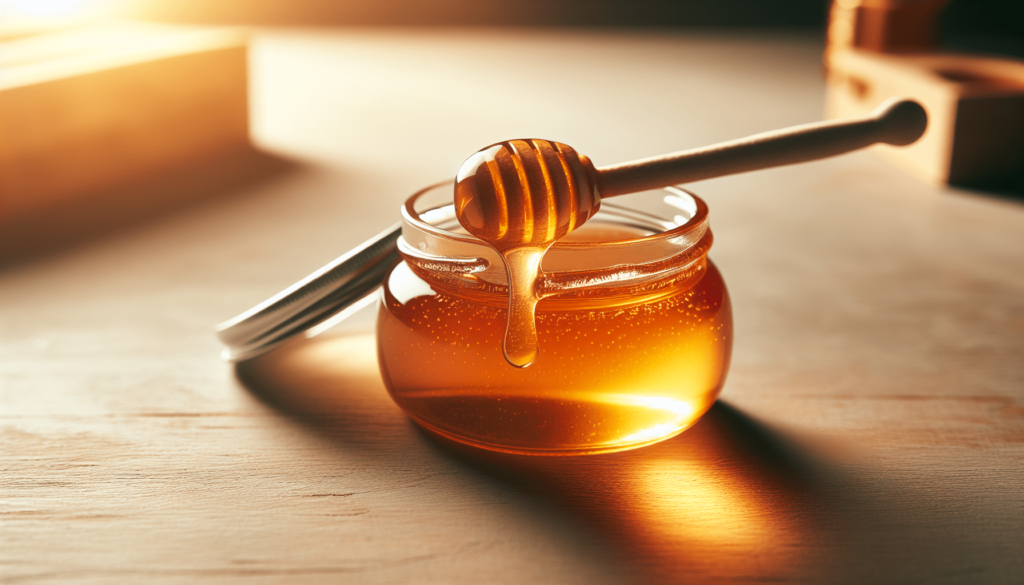Dry lips can be bothersome and uncomfortable, but finding the best way to treat them doesn’t have to be a daunting task. Whether it’s due to harsh weather conditions, dehydration, or certain medications, dry lips can be effectively treated with a few simple steps. From hydrating lip balms and exfoliating scrubs to staying properly hydrated and protecting your lips from the elements, this article explores the various techniques and remedies that can help you achieve smooth and moisturized lips. Stay tuned to discover the ultimate solutions for banishing dryness and achieving a smile that feels as good as it looks.
Natural Remedies
Honey
One of the most effective natural remedies for dry lips is honey. Honey is known for its moisturizing and healing properties due to its high content of antioxidants, vitamins, and minerals. To use honey as a remedy for dry lips, simply apply a thin layer of honey over your lips and leave it on for 10-15 minutes. Then, rinse it off with warm water. Repeat this process daily to keep your lips hydrated and nourished.
Coconut Oil
Coconut oil is another fantastic natural remedy for dry lips. It has a rich texture that deeply moisturizes and nourishes the lips, leaving them soft and supple. To use coconut oil for dry lips, simply apply a small amount of oil to your lips and gently massage it in. You can leave it on overnight or use it as a lip balm throughout the day. Coconut oil also has antibacterial properties, which can help prevent infections on chapped lips.
Aloe Vera
Aloe vera is a versatile plant that has numerous benefits for the skin, including the lips. Its gel-like substance is incredibly hydrating and soothing, making it an excellent remedy for dry, chapped lips. You can either use fresh aloe vera gel directly from the plant or purchase 100% pure aloe vera gel from a trusted source. Apply a thin layer of aloe vera gel to your lips and let it sit for 15-20 minutes before rinsing it off with warm water. Regular use of aloe vera will help keep your lips moisturized and relieve any discomfort caused by dryness.
Lip Balms and Salves
Ingredients to Look for
When choosing a lip balm or salve for dry lips, it’s important to look for ingredients that provide intense hydration and nourishment. Some key ingredients to look for include beeswax, shea butter, cocoa butter, and almond oil. These ingredients create a protective barrier on the lips, locking in moisture and preventing further dryness. Additionally, look for lip balms that are fragrance-free to avoid any potential irritants.
Forms of Lip Balms and Salves
Lip balms and salves come in various forms, including sticks, pots, and tubes. The choice of form depends on personal preference and convenience. Stick lip balms are great for on-the-go application, while pots allow for more precise and targeted application. Tubes are often the most convenient, as they can be easily squeezed for effortless application. Whichever form you choose, make sure to apply lip balm or salve regularly throughout the day, especially before bed and before going outside in harsh weather conditions.
Exfoliation
DIY Lip Scrubs
Exfoliating your lips is an important step in treating dryness and removing dead skin cells. You can create your own DIY lip scrub using simple ingredients from your kitchen. One popular recipe involves mixing sugar with honey or olive oil to create a gentle exfoliating paste. Apply the scrub to your lips and gently massage in circular motions for a few minutes before rinsing off. This will help slough off dead skin cells and promote smoother, healthier-looking lips.
Store-Bought Lip Scrubs
If you prefer convenience or want to try a professionally formulated product, there are plenty of store-bought lip scrubs available. Look for lip scrubs that contain natural exfoliants such as sugar, salt, or coffee grounds. These ingredients help remove dead skin cells while providing nourishment to the lips. Before purchasing a lip scrub, read reviews and check the ingredients list to ensure that it is suitable for your needs and preferences.
Hydration
Importance of Hydration
Hydration plays a crucial role in maintaining the health and moisture of your lips. When your body is dehydrated, it affects every part, including your lips. Drinking an adequate amount of water each day helps keep your body hydrated from within, which reflects on the health of your lips. Hydration is essential for preventing dryness, cracking, and discomfort.
Drinking Water
To keep your lips and body properly hydrated, it is recommended to drink at least 8 glasses of water per day. This will help replenish the moisture lost through daily activities and external factors. If you struggle to drink enough water, try infusing it with fruits or herbs for added flavor. Carry a water bottle with you throughout the day as a reminder to stay hydrated.
Using a Humidifier
Another effective way to combat dry lips is by using a humidifier in your home or office. Humidifiers add moisture to the air, preventing it from becoming too dry and causing dehydration of the skin, including your lips. Place a humidifier in the room where you spend the most time, especially during the winter months when indoor heating can exacerbate dryness. This will help maintain a comfortable level of humidity and keep your lips hydrated.
Avoiding Triggers
Licking Your Lips
Licking your lips may provide temporary relief, but it actually worsens the problem. Saliva evaporates quickly, leaving your lips even drier than before. Additionally, the enzymes present in saliva can further irritate dry lips. It’s important to resist the urge to lick your lips and instead opt for a lip balm or moisturizing remedy.
Using Certain Lip Products
Certain lip products, such as those containing fragrances, dyes, and alcohol, can exacerbate dryness and cause irritation on the lips. When choosing lip products, opt for those that are specifically formulated for dry and sensitive lips. Look for products that are free from potential irritants and contain moisturizing ingredients to help restore moisture and protect your lips.
Protecting Lips from the Sun
Choosing Lip Products with SPF
Just like the rest of your skin, your lips are vulnerable to the harmful effects of the sun’s ultraviolet (UV) rays. Prolonged sun exposure can lead to dryness, sunburn, and even an increased risk of lip cancer. To protect your lips, choose lip products that have a sufficient sun protection factor (SPF). Look for lip balms or lipsticks with an SPF of 30 or higher and apply them generously before heading outdoors.
Applying Sunscreen
In addition to using lip products with SPF, it is also recommended to apply a broad-spectrum sunscreen to your entire face, including your lips. Choose a sunscreen that is specifically formulated for the face and lips, as these areas are more delicate and require extra protection. Apply sunscreen generously and reapply every two hours or as directed on the product packaging, especially if you’re spending prolonged periods in the sun.
Medical Treatments
Prescription Emollients
If natural remedies and over-the-counter products do not provide sufficient relief for your dry lips, consulting a healthcare professional may be necessary. They may prescribe a specialized emollient or ointment that contains ingredients specifically designed to hydrate and repair severely dry lips. Follow the instructions provided by your healthcare professional and use the prescribed medication as directed for optimal results.
Laser Treatment
In some cases, laser treatment may be recommended to treat persistent dryness and rejuvenate the lips. This procedure involves using laser energy to remove damaged outer layers of skin and stimulate collagen production in the lips. Laser treatment can effectively improve dryness, texture, and appearance, but it should be performed by a qualified dermatologist or plastic surgeon.
Fillers
For individuals with extremely dry and thin lips, fillers may be a suitable option. Fillers can provide volume and hydration to the lips, diminishing the appearance of dryness and enhancing their overall look. Hyaluronic acid fillers are commonly used for lip augmentation as they attract and retain moisture, providing a natural and long-lasting result. Consulting a qualified medical professional is essential to determine the most suitable type of filler and ensure safe and satisfactory results.
Lifestyle Changes
Balanced Diet
Maintaining a balanced diet is essential for overall health, including the health of your lips. Incorporate foods that are rich in vitamins, minerals, and fatty acids, as they promote healthy skin and lip hydration. Some lip-friendly foods include avocados, nuts, seeds, leafy greens, and foods high in omega-3 fatty acids, such as salmon or flaxseeds. A well-rounded diet will help nourish your body from the inside out, resulting in healthier lips.
Limiting Caffeine and Alcohol
Both caffeine and alcohol can dehydrate your body, including your lips. Limiting your intake of caffeinated beverages and alcoholic drinks can help maintain proper hydration levels and prevent dryness. If you do consume caffeinated or alcoholic beverages, make sure to balance them with an increased intake of water or hydrating fluids.
Quitting Smoking
Smoking tobacco not only has numerous detrimental effects on overall health, but it can also severely dry out your lips. Smoking depletes the moisture in your body and leads to dry, chapped lips. Quitting smoking is not only beneficial for your overall well-being but also for the health and appearance of your lips. Seek support from healthcare professionals or support groups to quit smoking and regain healthier lips.
Causes of Dry Lips
Dehydration
One of the most common causes of dry lips is dehydration. When your body lacks sufficient hydration, it affects all parts of your body, including your lips. Make sure to drink an adequate amount of water daily and avoid excessive consumption of dehydrating beverages such as coffee and alcohol.
Environmental Factors
External factors such as cold weather, low humidity levels, and exposure to wind can contribute to dry lips. Protecting your lips with lip balm or moisturizing remedies can help counteract these effects. Additionally, using a humidifier indoors can help maintain a comfortable level of humidity and prevent dryness.
Medication Side Effects
Certain medications, such as acne treatments or allergy medications, can have side effects that include dry lips. If you notice that your lips become dry or chapped while taking a particular medication, consult your healthcare provider. They may be able to adjust your medication or recommend additional remedies to alleviate the dryness.
When to Seek Professional Help
Persistent or Severe Dryness
If you have tried various remedies and lifestyle changes without significant improvement in your dry lips, it may be time to seek professional help. A healthcare professional, such as a dermatologist or a healthcare provider specializing in lips, can diagnose any underlying conditions and recommend appropriate treatments to alleviate persistent or severe dryness.
Presence of Pain or Discomfort
If your dry lips are accompanied by pain, discomfort, or any other unusual symptoms, it is important to consult a healthcare professional promptly. They can assess your condition, rule out any potential underlying issues, and provide appropriate medical interventions to address the discomfort.
Remember, treating dry lips is a combination of external care and internal hydration. By incorporating natural remedies, using suitable lip products, staying hydrated, and making lifestyle changes, you can effectively treat and prevent dryness, keeping your lips soft, smooth, and healthy.

